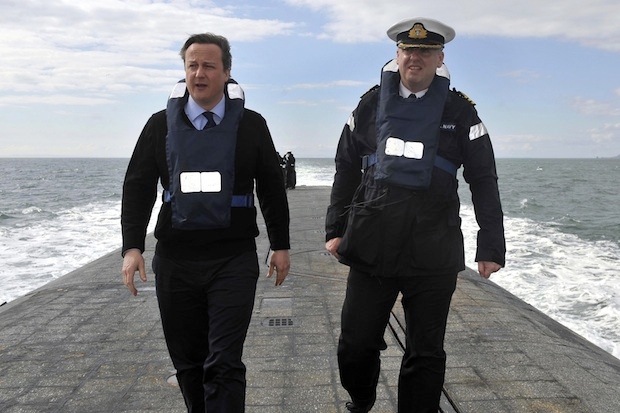Michael Fallon’s confirmation last week that a Strategic Defence and Security Review is underway adds another question to the Conservatives’ growing list of slim-majority headaches: what to do about defence policy. With George Osborne hitting the Ministry of Defence with the second-largest pre-Budget cuts of any government department earlier this month, and Number 10 reportedly looking for ‘creative’ accounting measures to cover the fact that Britain will no longer meet NATO’s defence spending target, hopes that defence might escape further cuts have quickly evaporated.
So the fact that the coming Spending Review is unlikely to deliver a rosy outcome for the MOD is already well known. The additional complicating factor, however, is the presence of various pre-election commitments on specific aspects of defence policy. In short, while unwilling to commit to safeguarding defence in general terms, commitments have been made on several individual capabilities. Incorporating such commitments and cutting budgets at the same time will make it all the harder to put the ‘strategic’ into ‘SDSR’.
So what are these commitments? Firstly, there is Cameron’s commitment – made in September last year – to commission and deploy both of the new aircraft carriers being built for the Royal Navy. Such a commitment ends speculation that one of the carriers would be immediately sold or scrapped. Secondly, there is the Conservative commitment – backed by the Prime Minister – to a four-boat replacement for Britain’s Trident-carrying Vanguard-class nuclear missile submarines. And thirdly, there is his commitment not to shrink the British Army below its current 82,000-troop target.
Other commitments – such as buying at least 48 aircraft from the troubled F-35B Joint Strike Fighter programme – have also been made by Cameron’s government, albeit not by the Prime Minister himself. Having perhaps expected to be able to blame the quiet abandonment of some policy commitments on their Liberal Democrat coalition partners, the Conservatives’ sudden acquisition of a majority leaves them bearing the whole responsibility for their defence choices.
This isn’t to say that the commitments made are bad ones. If Britain is going to operate aircraft carriers at all, as it should, it needs at least two. Otherwise, adversaries can easily time potential aggression to coincide with the maintenance or training schedule of a single ship. Similarly, if Britain is going to have any kind of nuclear arsenal, it must sustain Continuous At-Sea Deterrence – which necessitates a four-boat Trident replacement – to ensure that international crises do not create incentives for escalation. An Army of fewer than 82,000, meanwhile, would risk losing the capacity to sustain even a single combat brigade indefinitely in-theatre.
Nonetheless, a combination of further fiscal contraction and prior commitments makes challenging terrain for a defence review, with a risk that capabilities that have not received prime ministerial pre-commitment will be disproportionately squeezed. Coming against a backdrop of military confrontation with a newly-belligerent Russia, interminable counter-terrorist operations across the Middle East, the Royal Navy’s ongoing role in the Mediterranean migrant crisis, and enduring tensions in the South Atlantic, there must come a time when even Osborne’s Treasury questions whether defence expenditure as a proportion of GDP can only ever fall.
Certainly, if Cameron’s previous defence commitments are to be kept and the Services to receive the equipment and personnel they need to confront such a threatening future, spending will have to rise – as two cross-party reports in the last Parliament implied. Since that seems unlikely to happen, British defence looks set for further resource-starved ‘muddling through’. With some Labour leadership candidates committing to NATO’s 2%-of-GDP defence spending target, moreover, the Conservatives could yet pay a political price for this approach, contrary to the received wisdom.
David Blagden is a lecturer in International Security and Strategy at the University of Exeter







Comments